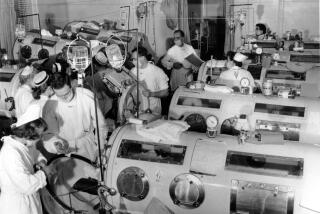Quiet Hero in Battle Against Polio Dies : John F. Enders, 88, Gained Nobel Prize for Research on Viruses
- Share via
John F. Enders, who despite a Nobel Prize remained a relatively unsung hero in the victory over polio, is dead.
Dr. Enders, who was 88, died Sunday at his summer home in Waterford, Conn.
In 1949, the virologist and two of his students, Dr. Fred C. Robbins and Dr. Thomas H. Weller, published a paper in which they told of growing polio and other viruses in the tissue of embryos in their laboratory. It was a long-sought breakthrough made possible by the discovery of antibiotics during World War II. Enders and his team had used antibiotics to ward off the contaminants that had made earlier attempts to grow viruses impossible.
From their work came the vaccines created by Drs. Albert Sabin and Jonas Salk that have virtually eradicated polio, once the No. 1 crippler of children in the nation.
Enders’ isolation of viruses also led to vaccines against measles and mumps and became a major development in the battle against cancer.
The paper the three men published in Science magazine became the basis for the Nobel Prize they shared in 1954. But that was the year that Ernest Hemingway became the Nobel Laureate in literature and most of the world’s attention was focused on the colorful author.
The headline in the Los Angeles Times on Dec. 11, 1954, was typical. It read: “Hemingway, Six Others Receive Nobel Awards.”
Although Enders was not a medical doctor, those physicians who studied under him at Harvard University referred to him as “The Chief.” Enders, at his death a professor emeritus at Harvard, had received a masters degree in English there in 1922 and a doctorate in microbiology in 1930.
Associate Professor
In 1932, he was appointed as an instructor in the Harvard Medical School’s bacteriology and immunology department. He had been teaching at Harvard for several years but was still only an associate professor when he won the Nobel Prize. He became a full professor two years later.
In 1963, Enders was awarded the American Medical Assn.’s Scientific Achievement Award, and that same year received the Medal of Freedom from President John F. Kennedy.
Robbins, now president of the Institute of Medicine of the National Academy of Sciences, recalled the Nobel honor in an interview in Tuesday’s New York Times. He said of his former teacher that “there are very few scientists who would see to it that their younger colleagues would share in that recognition.”
More to Read
Sign up for Essential California
The most important California stories and recommendations in your inbox every morning.
You may occasionally receive promotional content from the Los Angeles Times.













